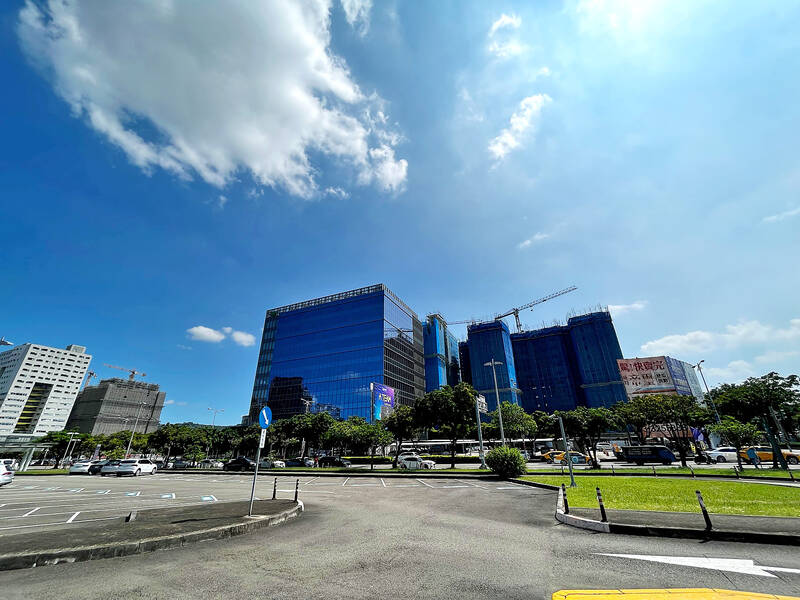Developers and builders last quarter launched NT$458.6 billion (US$14.24 billlion) in presale and new housing projects at record-high prices across the nation while sales rates slowed, a survey by Cathay Real Estate Development Co (國泰建設) found yesterday.
That represented an increase of 57.7 percent from the second quarter when builders postponed product launches amid concern over spiking COVID-19 infections.
Compared with a year earlier, the figure rose 35.2 percent, the quarterly survey showed.

Photo: Hsu Yi-ping, Taipei Times
Asking prices gained 2.99 percent on average to NT$472,300 per ping (3.3m2) nationwide, propelled by higher land, labor and building material costs, the survey showed.
Whether the uptrend is sustainable is a question, as people turn increasingly conservative amid high inflation, monetary tightening and other economic uncertainty.
The price tags are much higher in Taipei at NT$1.04 million per ping and at NT$529,200 per ping in New Taipei City, the survey showed.
Asking prices reached NT$496,600 per ping in Hsinchu County and Hsinchu City, rising 21.25 percent to become the third-most expensive in Taiwan, it said.
Presale and new housing prices grew 4.2 percent to NT$439,900 per ping in Taichung, 16.33 percent to NT$331,100 in Tainan and 6.52 percent to NT$325,000 in Kaohsiung.
In addition, developers and builders grew less flexible about price concessions, which dropped by 0.81 percentage points to 8.12 percent, the survey showed, with the room for bargaining smallest in Hsinchu at 5.44 percent and largest in Taoyuan at 9.49 percent.
The firm attitude reflected confidence on the part of sellers, which slowed transactions, with the average 30-day sales rate weakening 2.44 percentage points to 11.6 percent, the survey said.
Taoyuan had the lowest 30-day sales rate of 9.21 percent, although it improved 0.92 percent from three months earlier, it said.
The sales rate was highest in Hsinchu at 15.63 percent, despite a sharp decline of 13.97 percentage points from the preceding quarter.
Sales rates tumbled 8.53 percentage points to 13.56 percent in Tainan, but gained 1.84 percentage points to 12.09 percent in Kaohsiung.
The figures reflected a cautious attitude among prospective buyers, and the property boom fueled by local technology firms’ investment plans might have plateaued, it said.
In the first three quarters of the year, the market for presale and new housing projects put up a stronger performance compared with the same period last year, it said.
By contrast, the market for existing homes fared weaker, as transactions in the first nine months slipped into negative territory.

With an approval rating of just two percent, Peruvian President Dina Boluarte might be the world’s most unpopular leader, according to pollsters. Protests greeted her rise to power 29 months ago, and have marked her entire term — joined by assorted scandals, investigations, controversies and a surge in gang violence. The 63-year-old is the target of a dozen probes, including for her alleged failure to declare gifts of luxury jewels and watches, a scandal inevitably dubbed “Rolexgate.” She is also under the microscope for a two-week undeclared absence for nose surgery — which she insists was medical, not cosmetic — and is

CAUTIOUS RECOVERY: While the manufacturing sector returned to growth amid the US-China trade truce, firms remain wary as uncertainty clouds the outlook, the CIER said The local manufacturing sector returned to expansion last month, as the official purchasing managers’ index (PMI) rose 2.1 points to 51.0, driven by a temporary easing in US-China trade tensions, the Chung-Hua Institution for Economic Research (CIER, 中華經濟研究院) said yesterday. The PMI gauges the health of the manufacturing industry, with readings above 50 indicating expansion and those below 50 signaling contraction. “Firms are not as pessimistic as they were in April, but they remain far from optimistic,” CIER president Lien Hsien-ming (連賢明) said at a news conference. The full impact of US tariff decisions is unlikely to become clear until later this month

GROWING CONCERN: Some senior Trump administration officials opposed the UAE expansion over fears that another TSMC project could jeopardize its US investment Taiwan Semiconductor Manufacturing Co (TSMC, 台積電) is evaluating building an advanced production facility in the United Arab Emirates (UAE) and has discussed the possibility with officials in US President Donald Trump’s administration, people familiar with the matter said, in a potentially major bet on the Middle East that would only come to fruition with Washington’s approval. The company has had multiple meetings in the past few months with US Special Envoy to the Middle East Steve Witkoff and officials from MGX, an influential investment vehicle overseen by the UAE president’s brother, the people said. The conversations are a continuation of talks that

CHIP DUTIES: TSMC said it voiced its concerns to Washington about tariffs, telling the US commerce department that it wants ‘fair treatment’ to protect its competitiveness Taiwan Semiconductor Manufacturing Co (TSMC, 台積電) yesterday reiterated robust business prospects for this year as strong artificial intelligence (AI) chip demand from Nvidia Corp and other customers would absorb the impacts of US tariffs. “The impact of tariffs would be indirect, as the custom tax is the importers’ responsibility, not the exporters,” TSMC chairman and chief executive officer C.C. Wei (魏哲家) said at the chipmaker’s annual shareholders’ meeting in Hsinchu City. TSMC’s business could be affected if people become reluctant to buy electronics due to inflated prices, Wei said. In addition, the chipmaker has voiced its concern to the US Department of Commerce